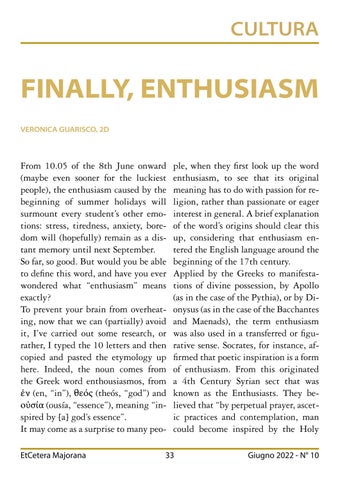C U LT U R A
F IN A L LY, E N T H U S IA S M V E R O N IC A G U A R IS C O , 2 D
From 10.05 of the 8th June onward (maybe even sooner for the luckiest people), the enthusiasm caused by the beginning of summer holidays will surmount every student’s other emotions: stress, tiredness, anxiety, boredom will (hopefully) remain as a distant memory until next September. So far, so good. But would you be able to define this word, and have you ever wondered what “enthusiasm” means exactly? To prevent your brain from overheating, now that we can (partially) avoid it, I’ve carried out some research, or rather, I typed the 10 letters and then copied and pasted the etymology up here. Indeed, the noun comes from the Greek word enthousiasmos, from ἐν (en, “in”), θεός (theós, “god”) and οὐσία (ousía, “essence”), meaning “inspired by [a] god’s essence”. It may come as a surprise to many peoE t C e t e r a M a jo r a n a
33
ple, when they first look up the word enthusiasm, to see that its original meaning has to do with passion for religion, rather than passionate or eager interest in general. A brief explanation of the word’s origins should clear this up, considering that enthusiasm entered the English language around the beginning of the 17th century. Applied by the Greeks to manifestations of divine possession, by Apollo (as in the case of the Pythia), or by Dionysus (as in the case of the Bacchantes and Maenads), the term enthusiasm was also used in a transferred or figurative sense. Socrates, for instance, affirmed that poetic inspiration is a form of enthusiasm. From this originated a 4th Century Syrian sect that was known as the Enthusiasts. They believed that “by perpetual prayer, ascetic practices and contemplation, man could become inspired by the Holy G iu g n o 2 0 2 2 - N ° 1 0



